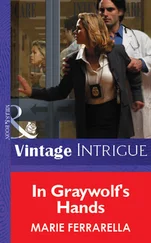Margrit’s eyebrows shot up so hard she rubbed her forehead, feeling like she’d sprained something. “Who told you that?”
“Tony called me.”
“Tony called you?” Margrit couldn’t put enough emphasis on the words and fought off the urge to repeat them with the stress on a different one each time. Anthony Pulcella and Rebecca Knight had suffered a kind of long-running standoff in the years he and Margrit had dated. Disapproval went too far, but for Rebecca, Margrit’s decision to date a man not of her own ethnic background was as much a political statement as a romantic one. Rebecca’s capitulation, only two weeks earlier, had coincided perfectly with Margrit and Tony’s breakup, though in her mother’s defense, Rebecca hadn’t known that when she’d finally given up the fight. Still, Tony calling Rebecca was well outside Margrit’s expectations. “What’d he do that for?”
“He’s worried about you, Margrit. So am I. He said he saw you leaving the site of the dockside fire this morning. Did he?”
Margrit found herself staring sightlessly down the street, humans and vehicles a blur against the backdrop of tall buildings. She heard her own thought distantly: humans and vehicles. Not people, but humans. Some morning she was going to wake up and not quite recognize herself anymore. Maybe this morning, in fact, though she hadn’t been to bed and therefore morning hadn’t been properly introduced. The recollection made her yawn and heated her eyes with tears, helping her shake off her stupor. “Mother, what would I be doing at the docks?”
“I don’t know, Margrit. What would you be doing not in court today?”
“Trying to stop the mess at the docks,” Margrit said, more honest than wise. “Tony was right. I was there. I’m fine, though, so don’t worry.”
“Don’t worry? Margrit, how can I not worry? Your behavior has been erratic since Russell died. I don’t want to pressure you, sweetheart, but I think you should talk to someone.”
“I talk to people all the time, Mom,” Margrit said, a smile starting, and then the expression was choked off in a burst of absurdity bordering on offense. “You mean, a psychiatrist?”
“I was thinking a psychologist. You don’t seem to be depressed, but someone to talk to about this sudden decision to change careers and going to work for Eliseo Daisani, of all people, and missing court dates, and this delusion of being able to stop fighting and striking workers at the docks—”
“Mom. Mom! Mother! I’m fine, Mom. I really am. Look, I’m working on something bigger than I am, and that’s all I can tell you. I know it seems as if I’ve been acting strangely lately—”
“Seems?”
Margrit blew her cheeks out. “All right, I have been. But I have reasons, and if I ever can, I’ll tell you. Okay?” She bared her teeth as she recognized the promise as one she’d given Tony too many times. “I’m sorry I can’t tell you now,” she added more quietly. “I wish I could. But I’m being as careful as I can be, and everything’s going to be all right.” She sounded confident and reassuring to her own ears, and hoped that her mother, at least, would believe it.
“Margrit, does this have anything to do…” Rebecca fell silent a long moment, then let go a quiet breath. “Never mind.”
“It does.” Margrit swallowed, hoping she’d interpreted her mother’s unasked question correctly. Rebecca Knight had twice seen—or experienced—Daisani’s inhumanly fast ability to move. Unlike Margrit, she seemed reluctant to pursue the how behind his talent, even when she owed her life to it. That she and her mother lay on opposite sides of such a narrow divide made Margrit’s chest ache with loneliness. “Mom—”
“I see.” Rebecca’s voice turned to a professional briskness that told Margrit she’d once again lost the moment to pursue a thread of connection between them. “Please be very careful, sweetheart. I’ll tell your father I spoke to you today. We both love you.”
“I love you, too.” Margrit folded her phone closed and directed a frustrated glare at the street, as though somewhere below, Janx would feel its heat. “If I haven’t made my choice, I’d like to know what the hell else this is.”
“The consequence of living,” an auburn-haired woman replied as she brushed past. Margrit blinked and the woman threw a bright smile over her shoulder. “Never could resist a rhetorical question.” She disappeared into the crowd, leaving Margrit still blinking after her.
Tony Pulcella was waiting on her doorstep when she got home.
Margrit slowed halfway up the block, unexpected cheer from the woman’s comment fading as she saw the detective. There was nothing she could say that would satisfy him. For a moment she looked around for an escape route, but by the time she looked back, he’d seen her and was rising to dust off his pants. Margrit sighed and joined him, itchingly aware she was still grimy from the encounter at the warehouse.
Tony looked exhausted, though he was cleaner than Margrit. For a moment they stood there looking at one another, before Margrit shrugged and tilted her head at the building’s front door. “Want to come up?”
He nodded silently and Margrit opened the door, and, out of consideration for his weariness, took the elevator to the fifth floor, neither of them speaking until they’d entered Margrit’s apartment. Then Tony said, “You’re okay,” and, “You know where he is,” as though the two comments—not, Margrit noticed, questions—were related.
“I’m fine. You look like hell.” Margrit toed her shoes off and padded into the kitchen to open the fridge so she could offer Tony a Coke. He accepted and drained it without speaking, then turned an expectant gaze back onto Margrit, who shrugged and addressed the other half of what he’d said. “I know he’s down below the city. I doubt I could find where he’s staying. I’m not much help there. Sorry.”
“How long’ve you known?”
“This is the first time I’ve seen him since you raided the House.” Both true and evasive, the same kind of answer she’d been giving Tony since she’d first encountered the Old Races. He’d been more than right to make a final break in their relationship. Margrit released her hair from its bonds and scratched her hands through it.
“So what were you doing there this morning?”
“Cara Delaney was hurt in a fight down there yesterday. She asked me to go reassure her people. I had no idea Janx would be there.” That, at least, was true.
“And you left with him because…?”
The corner of Margrit’s mouth turned up. “Because I didn’t want to sit through the third degree, I guess.” She hesitated, then admitted, “Because I figured you’d cover for me.”
“So you did see me.” Neither surprise nor anger colored Tony’s voice, cool professionalism in place instead. Regardless, recrimination stung Margrit as she nodded. “I thought you had. You’re right. I did cover for you. Maybe you can tell me why.”
Margrit drew breath to answer and Tony held up a palm, stopping her. “Better yet, maybe you can tell me why damned near every security camera we’ve found dockside is fritzed out and why on the handful that aren’t, the images are smeared.”
“Smeared?”
“Like in the cameras from the Blue Room.”
“Oh.” Vivid memory played up as though she watched the videos again. Pixels had stretched and distorted behind Alban, making shadows when nothing was there. Only later had she realized that the camera had picked up some hint of Alban’s true shape, and that she had been looking at his obscured wings. Janx would presumably generate such a blur of raw pixels that the man at their center would be rendered completely invisible. Then curiosity straightened her spine. Daisani did regular television interviews, and Kaimana Kaaiai had been filmed, neither of them with the distortion she’d seen in the dance-club camera recordings. She would have to ask the vampire how that was. Maybe something to do with converted mass. Though she’d only seen a baby selkie transform, Deirdre Delaney’s size had seemed comparable in both shapes. Perhaps vampires and selkies had less to hide, so to speak.
Читать дальше












